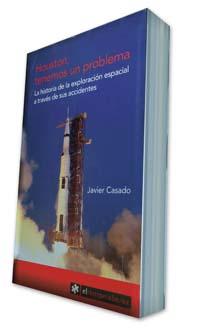History from accidents

The Apollo program left two famous phrases. The first was said by Neil Armstrong on July 20, 1969, when the surface of the Moon descended: "This is a small step for the human being, but it is a great leap for humanity." The second said Jack Swigert, an astronaut from the Apollo XIII mission, on April 13, 1970, when he realized they had a leak from an oxygen tank: "Houston, we have a problem." The aeronautical engineer Javier Casado has turned this second phrase into the title of this book, which tells the story of astronautics through accidents.
From his first accident at Baiconur station, kept secret for many years, to the problems and accidents suffered by NASA launchers, including the accident of the pitcher Challenger, which we could watch on television. The astronautics also had great successes. He also counts Casado.
Alternating successes and surprises, it focuses mainly on Russian and American trajectories, but not only on them. It also analyzes some accidents that occurred in the programs of China and Brazil. Moreover, the topics of some chapters are more related to missile technology than to space exploration vessels. However, being a background of these ships, the author wanted to give importance to the investigation of missiles and accidents that occurred in the investigation. The history of weapons development and astronautics was full of problems.
Sometimes he speaks of serious accidents, with deaths among them, but also of small problems in many missions. And in the last chapter, the epilogue, analyzes the rumors about the dead cosmonauts.
The book is written correctly and is very easy to read. It offers great details of the missions and makes an assessment of the causes of the accidents it relates. The problems arising in each mission are an important reference so that the same does not happen in the following missions, which makes Casado take very well the thread of the history of astronautics by chapters.





